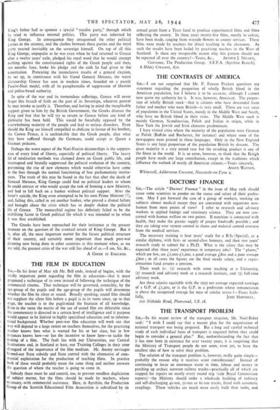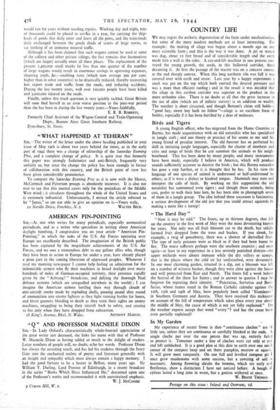THE TRANSPORT PROBLEM
Sta,—In his recent review of the transport situation, Mr. Noel-Baker said: "I wish I could say that a master plan for the organisation of national transport was being prepared. But a long and careful technical study of each individual form of transport is required before they could begin to consider a general plan." But, nothwithstanding the fact that it has now been in existence for over twenty years, it is surprising that the Ministry of Transport people do not seem, even yet, to have the smallest idea of how to solve their problem.
The solution of the transport problem is, however, really quite simple— probably the reason why it receives scant consideration! Instead of continuing to incur an enormous waste in time, labour and money in patching up archaic outworn railway trucks—practically all of which are stopped, for repairs on nearly every round trip (vide Royal Commission reports)—the Ministry should order a wholesale building of ordinary and self-discharging 4o-ton, 50-ton or 6o-ton trucks, fitted with automatic couplings. These vehicles are much more easily built than tanks, and would run for years without needing repairs. Working day and night, tens of thousands could be placed in service in a year, for carrying the ship- loads of goods that daily.enter and leave all the ports, and the train-loads daily exchanged between the goods sheds of scores of large towns, to say nothing of an immense mineral traffic.
Although it has been claimed that such wagons cannot be used at some of the colliery and other private sidings, the fact remains that locomotives (which are larger) actually enter all these places. The replacement of the present 1,400,000 small trucks by less than one quarter of the number of large wagons would result in enormous savings in operating expenses, shunting yards, &c.—enabling rates (which now average 200 per cent. higher than in other countries) to be drastically reduced, thereby recovering lost export trade and traffic from the roads, and reducing accidents. During the last twenty years, well over roo,000 people have been killed and 3,000,000 injured on the roads.
Finally, unless this truck question is very quickly tackled, Great Britain will soon find herself in an even worse position in the post-war period than she has been in during the last twenty years.—Yours faithfully, E. R. B. ROBERTS, Formerly Chief Assistant of the Wagon-Control and Train-Operating Depts., Buenos Aires Great Southern Railway.
Eynesbury, St. Neots.



























 Previous page
Previous page